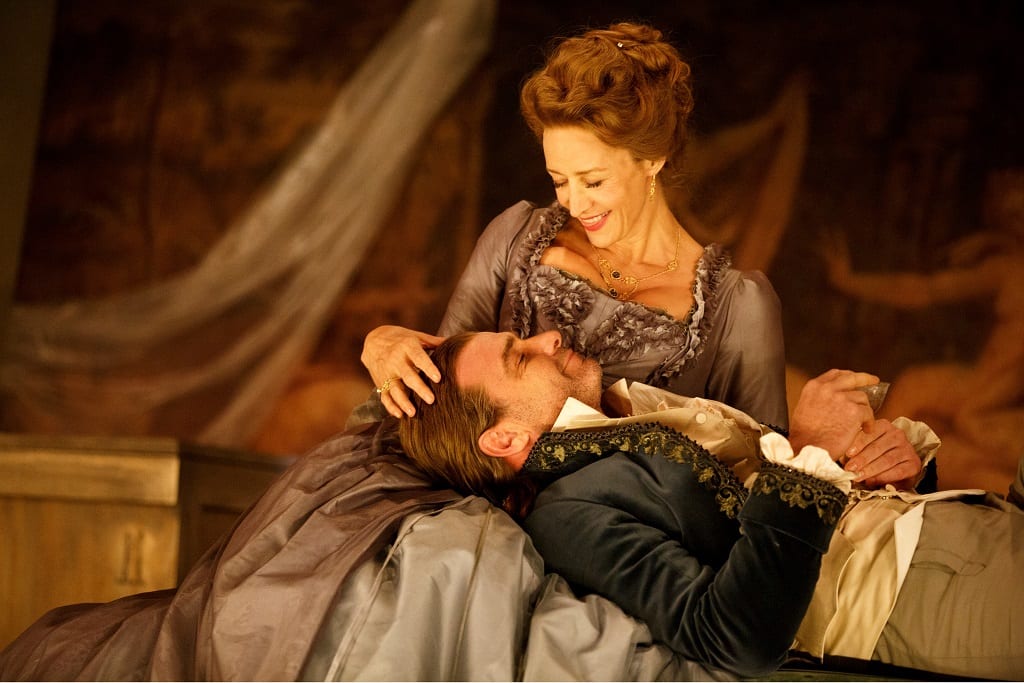Valmont’s reputation for savage civility precedes him. The play takes place in the 1780s, not long before the French Revolution, and is a portrait of a courtly life that has lost any claim to moral validity for the ruling class. Le Vicomte de Valmont and his former lover and long-time associate La Marquise de Merteuil occupy their time devising seductions for the notorious Valmont to carry out for the sheer pleasure of then privately laughing at their soon-to-be-dumped prey. The single set is a great faded room in a decaying rococo palace. (The theme is decadence apparently.) Large painted canvases of the period are wheeled here and there and never hung. Chaises are moved about between scenes by surreal visitations of robed women, while the many chandeliers are variously raised, lowered, or replaced by banks of cold fluorescence.
For me, Liev Schreiber on stage has always been definitive: the definitive Eddie Carbone in A View from the Bridge, the definitive Roma in Glengarry Glen Ross, in those cases both urban ethnic characters. In Valmont he’s taking on the epitome of aristocratic, overripe, idle gentry. His interpretation turns on a basic deadness at the core, and a general disengaged boredom with most of life, hence Valmont seeking diversion in the dangerous– mocking the moral pretensions of his class by subverting them. This dead-cored boredom is an entirely valid interpretation, intellectually worth exploring and executed with utter commitment by Schreiber. But it is an essentially unengaging choice to watch. If Valmont feels no risk in his high stakes gambits, if his pulse never quickens, neither does ours. Yes, the situations and complications do add up, and there is some payoff in the end (and some damned good swordplay that in itself elegantly reveals character). But this sapped emotional energy, as if his lines had to be delivered through a pillow, makes it, instead of a thrilling romp, a very slow, nearly three-hour wind up before we get the pitch.
He is paired with another stage titan, Janet McTeer, who we remember so well on Broadway from her turn as Nora in A Doll’s House. Here as the veteran sexual adventuress de Merteuil, Valmont’s total match in curdled cynicism, McTeer can make us pay attention to her with the merest flick of a fingernail in the air. We get more Iago-like pleasure in manipulation from La Marquise, and other dimensions too as we come to understand that, for her, it’s ultimately all about maintaining a tenuous freedom from male domination, and specifically about conquest of him. Sadly there’s not a great deal of chemistry between the principals–we sense more mutual respect than anything.
More convincing were the “marks” in Valmont’s romantic cons, first Elena Marcouris as (brace yourself for the ick factor) an ingenuous fifteen-year-old turned sexual enthusiast. But as Madame de Tourvel, the true heart of the show, still capable of being wounded, Brigitte Sorensen is a stand out, believably protecting the true precious value of her good conscience. Valmont targets the married M. Tourvel for conquest precisely because of her reputation for moral virtue. But she’s so much more human than this makes it sound. Without her, the play is mere topsy -turvy deviltry. With her, and with her plight conveyed with such vulnerability, there is sorrow and pity that lingers and instructs.

